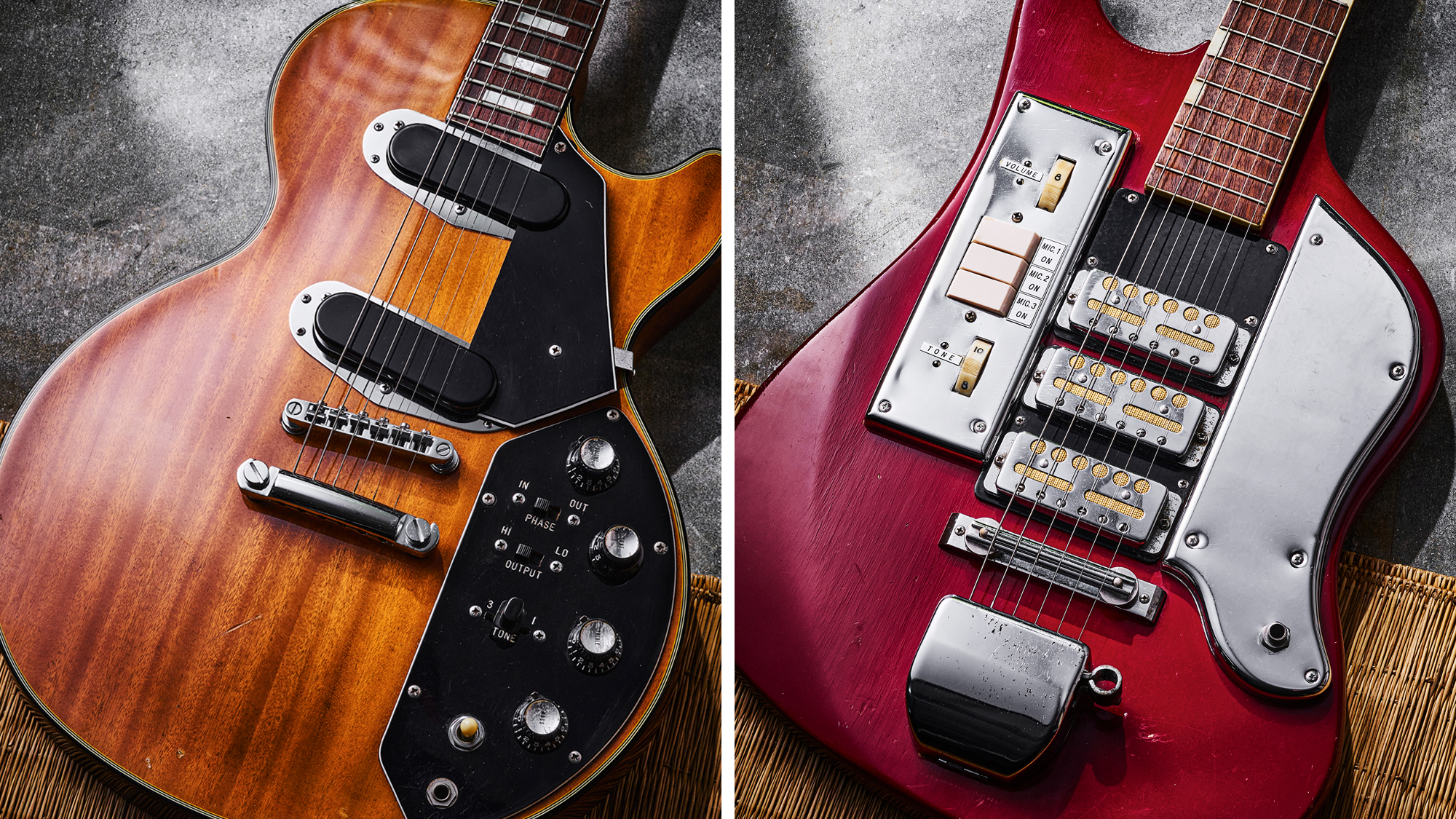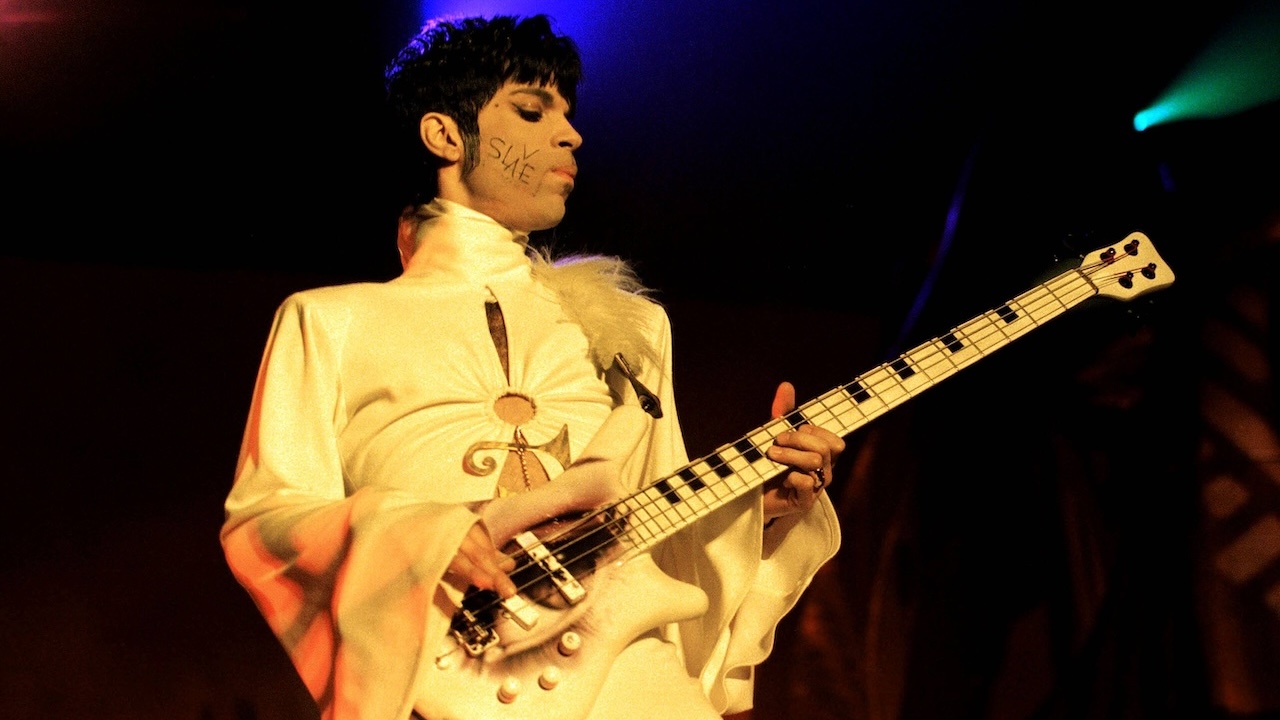Sam Fender: “When you write a melody, it’s like your soul talking – you’re finding it through pure feeling”
Acclaimed by Elton John and Paul Weller, Fender's new album Seventeen Going Under is a masterclass in songwriting – he walks us through his process and looks back on his guitar journey so far

Sam Fender is a happy man. “I’ve bought my first ever daft guitar,” he says with a cheeky grin. It’s just a few days after his triumphant sets at Reading and Leeds Festival and he’s still a bit ‘groggy’, but when he brandishes his brand-new acquisition – a beautiful 1959 Fender Jazzmaster – he visibly perks up.
“I got the record deal and got a bit of money,” he says, “so I was like, ‘Right, I’m gonna get myself a really nice guitar.’ I love Les Pauls, Strats and other Fenders, but this has got that brightness that I’ve always wanted – that heartland rock, Tom Petty twang. Sometimes with my Strat I feel like my chords are pissing in the wind, whereas this feels like it’s got more bite.”
It’s a fitting token of the 27 year-old’s current run of success. In September 2019, his debut album Hypersonic Missiles debuted at No.1 on the UK chart, winning the Critics’ Choice Award at the Brits, Fender garnering wide acclaim for his direct, indie-style rock and earthy, meaningful lyrics. The tour for that album was cut short by the pandemic, and over the enforced lockdown hiatus Fender hunkered down at his home in North Shields, and wrote the material for his second album.
From its yearning title track, to urgent cry from the heart Aye, to dark, seventh-chord heavy The Leveller, Seventeen Going Under is a remarkable record, delivered with Fender’s earnest, keening vocal – not unlike that of The Killers’ Brandon Flowers – and packed with melodies, ear-catching guitar riffs, and the kind of sensitive, poetic lyrics rarely heard in the poppier sphere these days.
He’s made some well-known friends since his star rose, some who know a bit about songwriting themselves, including Elton John and Paul Weller.
“They’ve been great, and both have their opinions on the album. Paul’s great to bounce things off because he’s a lyric writer himself, he really engages with that. Last To Make It Home is his favourite track on there.”
Weller’s choice is an acoustic-style ballad, its simple Aadd9/E/Dadd9 chord structure nodding to the Americana/folk vibe of Ryan Adams – a Fender influence – circa his 2001 album, Gold. On Mary, Fender sings: ‘You were online and the sociopathic part of me hit the ‘Like’/In the hopes I’d coax you out of my derelict fantasy.’
Get The Pick Newsletter
All the latest guitar news, interviews, lessons, reviews, deals and more, direct to your inbox!
Elton John’s own favourite on the record, Fender says, is Spit Of You. Lyrically it centres on a moment when Fender saw his father kiss his grandmother’s forehead after she died: ‘It was love in all its agony, every bit of me hurting for you/’Cos one day that’ll be your forehead I’m kissing/And I’ll still look exactly like you’.

It’s powerful, poetic, personal stuff – traditional songwriting with a modern edge. Musically, this insistent tune rides on Fender’s trademark three-part indie-rock guitar arpeggios (played on the record by him and his co-guitarists, Dean Thompson and Joe Atkinson), which give movement to the main E/F#m/D/C#m/F#m/D progression.
The new Jazzmaster’s yet to make its studio debut, but there are other ones, plus Strats and Teles, on the record. Spit Of You’s killer feedback solo is a Jazzmaster through a Red Llama pedal: “It’s this big, fuck-off overdrive Tom Petty said he liked,” he says, “so I got one. I just cranked it, had everything blaring, and got my whammy bar going to get the feedback.
“At every point in the room I had tape markers down for the points where I had really good feedback – one where I’d get a screech, one for the high note, another for the low. It was like a guitar feedback compass! My dad taught me that trick.”
It was his father, a guitar player himself , who bought Sam his very first guitar, back when he was eight. “It was a ‘divorce’ Christmas present,” Fender says now. “My parents got divorced, I got a TV off my mum and a guitar from my dad: a Peavey Strat copy with a Peavey practice amp. And it’s still a great guitar – I play it from time to time.
“Dad’s a great rhythm guitarist, and he showed me some basic chords and set the guitar up nice. That’s one thing I’d say to a kid just starting out – get your guitar set up, so it’s not like you’re battling bits of cheese wire! My brother was a musician; drums was his first instrument. I think I got into music as a way to be close to them.”
The Peavey spent a year untouched in the corner of the young lad’s room, but when he was 10 he finally got the bug. He learned the big hits by Nirvana, Green Day, Oasis.
When his father saw he was both obsessed and talented, he got his some guitar lessons, and Fender took off: “I was flying by the time I was 13, learning all the hard-rock stuff like Led Zeppelin and Guns N’ Roses. I got Slash’s autobiography when I was 12, and learned all his solos – I had this one blues lick that I used to just rip over the top of every song.”
He soaked up chords, blues scales, major scales, arpeggios – which all seemed pretty unglamorous and tedious to him as a kid, until he woke up one day and, as if overnight, he had become a pretty good guitarist.
“It’s an invisible muscle you don’t see that’s getting trained,” he reckons. “Then when you come to play anything you’ve learned, or any song you want to learn, you realise how much all of these things are just incorporated into it naturally.
“I wouldn’t be able to write the stuff I write right now had I not got the finger strength to play the major scales and stuff ,” he continues, “because I like to make quite interesting chords where my fingers are in very awkward positions.
“But I wouldn’t have had the knowhow or the confidence to try and write that sort of stuff had I not had that. My theory is shit, though, really. I’m an ear player and can’t read music at all. But if someone's playing I can get up and play lead on any song they’re playing, just by hearing it.”

He gives us an example of one such claw-like chord, used in Hypersonic Missiles tune Dead Boys. It’s an E minor shape with open strings [E-x/A-7/D-5/G-0/B-8/E-0], followed by a tasty Dadd9/11 [E-x/A-5/ D-7/G-0/B-7/E-0].
But whereas most players would use their fourth finger for that B-string note, Fender uses his ring finger, leaving his pinky free to add extended notes elsewhere as needed. These chords are used on Spit Of You, too, shifted up two frets into E, the capo on the 2nd fret for those open strings.
The title track from Seventeen Going Under and the anthemic, angry Paradigms are in C#, an unusual key for a guitar band. Fender often uses a guitar tuned to C# standard (C#/F#/B/E/G#/C#), something he says happened by accident. “I have a tendency to write everything at the top my vocal range, because I feel like I need to prove myself. I had to figure out ways of taking the keys down for live, so I tuned [from his preferred Eb standard] to C#.
But then I ended up loving the sound of the guitar in that key, so started writing songs in C# that were still at the top of my range! So I’m constantly having to work out ways of successfully playing my shows without killing my voice. I’m always belting.”
As a songwriter, he cut his teeth while playing with his teenage rock trio. He wrote daft comedy songs at first (he was a Tenacious D fan), but these got him into the habit of sitting on the sofa with his guitar, putting chords together and singing.
“When I started getting angsty and heartbroken about girls, that was when the real songs started,” he says. “They completely sucked, but you’ve got to start somewhere. As cringe as this sounds, it became my earliest form of therapy. I was quite angsty with the fact that my mam had moved away. A lot of those more emotionally challenging parts of my childhood drove me to learn something, so I could have an outlet.”
He had some exemplary artists to learn from – Joni Mitchell, Adam Granduciel of The War On Drugs and Jeff Buckley. His brother gave him a copy of Buckley’s classic 1994 album Grace, and Fender has clearly picked up some vocal tics from the late singer. Sam’s dad was a huge Steely Dan fan, and that band’s harmonically complex blend of jazz and rock was often on in the car and the kitchen. “And you do absorb that when you’re young,” Fender says.
“It became a part of my musical makeup, subconsciously, not that you hear any of the Steely Dan influence on my first record, but on the new one there’s a trumpet solo on Mantra, which I wrote. I sang it and a mate wrote the music out. I wrote the horns on Long Way Off, a very Steely Dan-like horn section. I wanted it to sound like [the Dan’s] The Caves Of Altamira meets indie [rock]!
“For the string parts, I’d just sing them to [arranger/cellist] Rosie Danvers, then she wrote them down, and we’d go into the studio and record it with a string section. You can write string parts on the guitar, too. I do a lot of that. I’ll put a reverb pedal on and make the guitar sound like strings, then write the parts, then we’ll put the real strings in after, and delete that guitar.”
As for Fender’s songwriting process, sometimes he’ll begin with a melody or chord progression; other times he’ll have some lyrics. “The melody-first ones tend to be singles. Get You Down came as a chord progression. Some of my favourite songs are the ones I write the lyrics for first, but there’s something that comes out of you when you write a melody – it’s like your soul talking, you’re finding it through pure feeling.”

One artist’s inspiration rings particularly clear through Fender’s sensitive, small-town stories. Bruce Springsteen’s Born To Run was a life-changing album for him. Superficially, Springsteen’s presence is here in the wailing saxophone, jangling piano and glockenspiel scattered throughout the record.
But more deeply, it’s in Fender’s novelistic eye for local colour, those vivid, real-life details, as on the melancholy Dying Light: ‘This town is a world of waifs and strays, comedy giants, penniless heroes/Dead men at the bar, I drank with them all’.
“Some of my favourite Springsteen lyrics are purely descriptions,” he says. “No metaphor, no meaning, just, ‘Barefoot girl sitting on the hood of a Dodge drinking warm beer in the soft summer rain’ [from Jungleland]. Immediately, you’re there, and it’s romantic. The vast majority of popular music now isn’t that kind of descriptive songwriting. I think the reason I’m getting any recognition is because people are missing that.
“Think of all the ballads that were huge hits in the 80s – Suzanne Vega’s Luka, or Tracy Chapman’s Fast Car. That’s the exact sort of songwriting I love. The only time you get it in popular British music is in the grime and hip-hop side.
“Writers like Kendrick Lamar – the explanation of their surroundings is so real and visceral. But with pop music now, a lot of ballady songs are, ‘I love you, you don’t love me’, or ‘I love you and you love me and it’s very nice’. And sex has always been a thing – there’s a lot of people trying to be the most provocative at the moment.”
With his pin-up good looks, you might think his label would lean on him to tone down the angst and social realism, and make something similarly poppy/pappy/sexy. He laughs, and casually hits a D on his new, well-earned Jazzmaster.
“They do sometimes say, ‘Sam stop being so fucking miserable, write us something a bit happier!’ But I do yearning and hopeful, not happy, because happy is boring. I like what ABBA do, which is sad lyrics and uplifting music. You can learn as much from ABBA as you can from The Beatles. They were absolute genius songwriters.” He’s not doing so badly himself...
- Seventeen Going Under is out now via Interscope.
Grant Moon is the News Editor for Prog magazine and has been a contributor to the magazine since its launch in 2009. A music journalist for over 20 years, Grant writes regularly for titles including Classic Rock and Total Guitar, and his CV also includes stints as a radio producer/presenter and podcast host. His first book, Big Big Train - Between The Lines, is out now through Kingmaker Publishing.
“Tom would say, ‘Play your guitar with a car key.’ It was very experimental”: Little Feat's Fred Tackett recalls Tom Waits' left-field approach to guitar playing – and his one-of-a-kind studio sessions
“Seeing friends and heroes of mine having their solos plagiarized broke my heart”: Giacomo Turra used their solos note-for-note for his own viral content. Now the guitarists who had their playing “stolen” are speaking out











